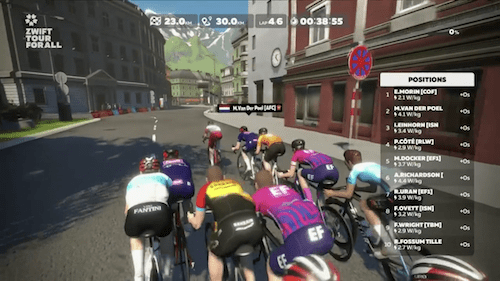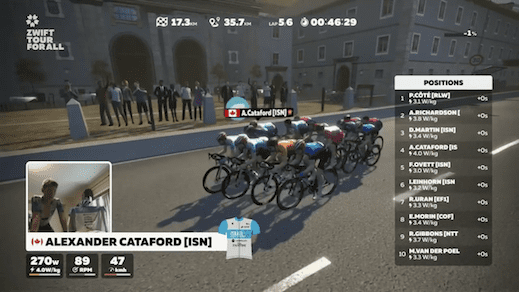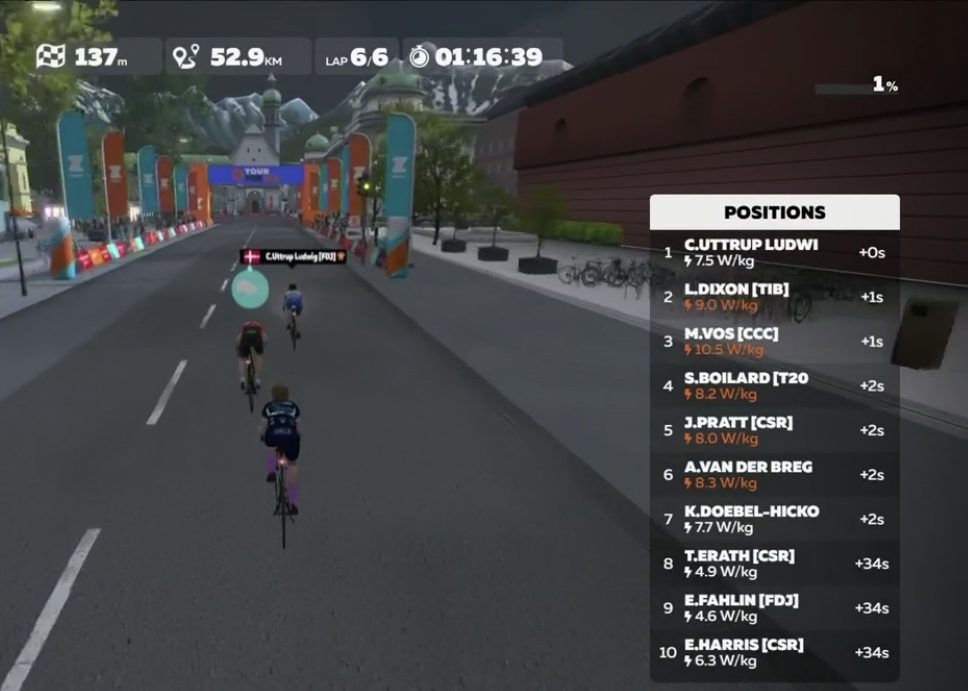Big names use tactical power-ups and sprint to the virtual finish on stage 1 of the Tour for All
The 52.9 km course made for a quick and punchy race

The Tour for All, an exhibition race series, is taking place from May 4-8. The same courses used in the race series will be available for anyone to ride throughout the month of May. Zwift created the event as a fundraiser for Doctors Without Borders and its COVID-19 crisis fund. The company has donated $125,000 to the organization, and will donate an additional $125,000 once 250,000 people complete a stage of the Tour for All.
The five day event has a stacked lineup, including riders from Mitchelton-Scott, EF-Education, NTT, Alpecin-Fenix, Bahrain-McLaren, Canyon//SRAM Racing, CCC-Liv and Boels Dolmans. Teams and the top 25 riders will gain points across the week alongside a daily individual race winner. There will also be intermediate points on each stage and double points for the top 10 on the Queen Stage (Stage 5).
The stages are short, meaning riders will likely be putting down the hammer for most of the race. The stages are 45 km to 75 km and approximately 400 m to 1700 m in elevation with race times estimated to be between 1hr 15min and 2hr.
Stage 1
Stage 1 of the Tour for All had familiar elements of bike racing but some riders were able to use the in-game power-ups to their advantage—an element of racing never seen in the real world. The stage, set in Innsbruckring, Innsbruck, was mostly flat but featured one short steep hill. Riders rode 6 laps of an 8.8 km loop for a total distance of 52.9 km with 72 m of elevation.
The men’s race consisted of nine teams of five riders each. The first few laps were relatively calm as racers settled into the virtual world, but on lap three a small group of 15 riders got away. Mathieu van der Poel of Alpecin-Fenix, Dan Martin of Israel Start-Up Nation, and Rigoberto Uran of EF Education First were some of the big names spicing up the breakaway group.
Ryan Gibbons of NTT Pro Cycling gained a number of points for his team during the intermediate sprints which occurred on each lap. Gibbons used the ‘ghost’ power-up at 10 km to go, disappearing temporarily and sprinting ahead of the lead group. A slimmed-down chase group caught him with 6 km to go, and Canadian Alex Cataford, racing for Israel Start-Up Nation attacked heading into the climb.

Cataford was pulled back by the group at the end of the climb and failed to hold on with the group. At 500 metres to go, Uran attacked, and nine riders followed. The top five crossed the line all within one second. Freddy Ovett of Israel Start-Up Nation ultimately took victory, just narrowly out-sprinting Emmanuel Morin of Cofidis and van der Poel. Gibbons finished fourth and Canadian Pier-André Coté came in fifth place.
Israel Start-Up Nation was able to secure the team win with 85 points gained through intermediate sprints and the first place win. EF Pro Cycling is currently second with 68 points while Alpecin-Fenix are third with 62 points, just narrowly ahead of NTT Pro Cycling with 61.
Vos’ aero sprint
The women’s race was broadcast only on the fourth of the six laps. At this point a group of nine riders had established a lead of one minute over the 36 other riders. The break included Marianne Vos of CCC-Liv, Cecilie Uttrup Ludwig of FDJ Nouvelle-Aquitaine Futuroscope, Leah Dixon of Team Tibco-Silicon Valley Bank, Anna van der Breggen of Boels Dolmans, Jess Pratt of Canyon-SRAM, Krista Doebel-Hickok of Rally, Simone Boilard of Twenty20 and Vittoria Guazzini and Ilaria Sanguineti of Valcar-Travel & Service.
The group mostly stuck together, although Sanguineti was dropped on the climb during the fifth lap. They maintained the one minute gap on the other riders until the last few laps. The lead pack began slowing down to conserve energy for the final sprint and the gap began to diminish.
Right before the final climb the chase group was within view and came within a few seconds of closing the gap but punchy climb broke up the groups again, and the lead group dwindled to seven with Guazzini dropping back.

Uttrup Ludwig took the final intermediate sprint and kept powering forward, creating a large gap going into the final kilometre. It looked like she could take the win with 150 m to go, but Vos had saved an ‘aero’ power-up for the final sprint. The power-up, which reduces drag for 15 seconds, helped her power forward and come sprinting past Uttrup Ludwig to take the win.
Uttrup Ludwig finished second with Dixon finishing third. Canyon-SRAM took the lead in the overall standings with 70 points thanks to strong intermediate sprints and two riders in the top 10. Team Tibco-Silicon Valley Bank is second with 64 points and Twenty20 is third with 59.
